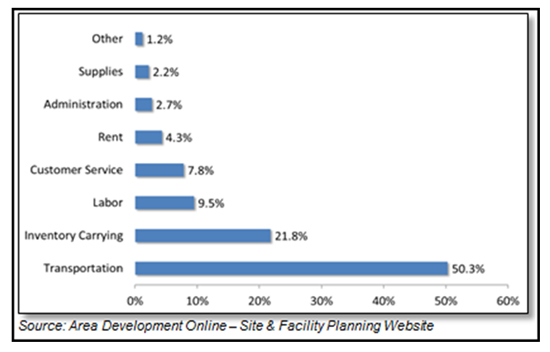Dr. Watson Says: |
 |
| ...Anything that can reduce transportation costs will get a lot of attention. |
|
What Do You Say?
|
|
|
|
Recently, I’ve seen a lot of coverage on the use of natural gas trucks. SupplyChainDigest and CSCMP’s Supply Chain Video news had a segment on Lowe’s move to natural gas trucks. The Wall Street Journal’s headline article yesterday in the Marketplace section was “Truckers Tap Into the Gas Boom.” And, at CSCMP in Denver, there were plenty of sessions on this topic.
This should be no surprise. As seen in the graph below, transportation costs represent a large portion of supply chain spend. Anything that can reduce transportation costs will get a lot of attention.

Previous Columns by
Dr. Watson |
|
|
These natural gas trucks may impact your supply chain design in three ways you didn’t anticipate.
|
1. |
You deliver more frequently because inventory becomes relatively more expensive. As transportation costs decrease, inventory starts to look more expensive. So, with cheaper natural gas trucks, it may be better to give up some of the transportation savings for an even greater reduction in inventory carrying costs.
|
|
2. |
You need more facilities. Although natural gas trucks are less expensive to run, there are still some constraints—filling up a tank can take all night, filling up a tank the “fast” way can lead to less range, and there is a lack of infrastructure to fill up in route. All this means that the natural gas trucks are best suited for trips that allow the truck to return back to the depot at night. To capture the savings from natural gas trucks you may need more warehouses closer to your customers.
|
|
3. |
You need better multi-stop optimization. If you deliver more frequently and within smaller geographic areas, it likely means that you will shift more deliveries to multi-stop routes. You will likely shift away from full trucks so that you can reduce inventory, and you will also shift away from LTL since you will have local fleets and nearby stops. This means that you will need to get better at developing multi-stop routes to efficiently deliver to your customers and make sure the trucks return back to the fueling station. |
|